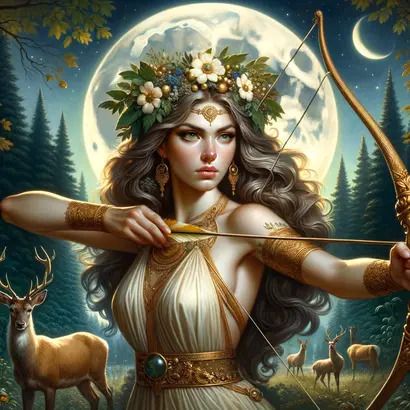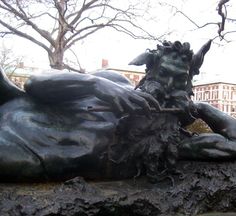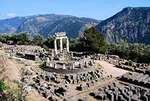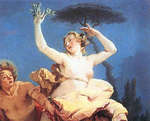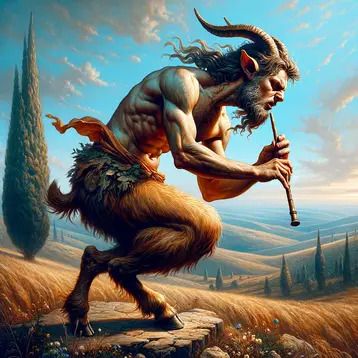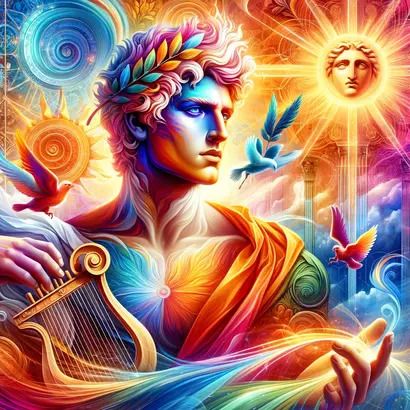
Apollo
☀ Apollo :: Greek God of Music and Light
Apollo is the Olympian god of light, music and poetry, healing and plagues, prophecy and knowledge, order and beauty, archery and agriculture. An embodiment of the Hellenic ideal of kalokagathia, he is harmony, reason and moderation personified, a perfect blend of physical superiority and moral virtue. A complex deity who turns up in art and literature possibly as often as Zeus himself, Apollo is the only major god who appears with the same name in both Greek and Roman mythology.
Apollo’s Role
Apollo's Name
The origin of the name Apollo is still not properly understood. Many Greeks seem to have supposed that it stands for “destroyer,” but this was only one of the many suggestions (“redemptory,” “purifier,” “assembler,” “stony”). Modern scholars disagree with most of them, with the majority linking Apollo’s name to the Greek word apella which means “a sheepfold,” and which may suggest that Apollo was originally merely a protector of the flocks and herds.
Apollo's Portrayal and Symbolism
However, in time, he evolved to become a multifaceted god adored all over Greece as the perfectly developed classical male nude, the kouros. Beardless and athletically built, he is often depicted with a laurel crown on his head and either a bow and arrow or a lyre and plectrum in his hands. The sacrificial tripod – representing his prophetic powers – was another common attribute of Apollo, just as few animals linked with the god in various myths: wolf, dolphin, python, mouse, deer, swan.
Apollo's Epithets
Apollo was in charge of so many things that, naturally, even his more famous epithets are numerous. As a sun god, he was called “Phoebus,” or “bright.” As a prophet, the Greeks called him “Loxias,” or “The One Who Speaks Crookedly.” As the god of music, he was known as the “Leader of the Muses.” Finally, the places of Apollo’s birth and worship adorned him with three other appellations: “Delian,” “Delphic,” and “Pythian.”
Apollo's Biography
Apollo's Birth
Apollo is the son of Zeus and Leto. As one of the numerous Zeus’s lovers, his mother incurred the wrath of Hera, who sent the dragon Python to pursue Leto throughout all lands and forbade her to give birth anywhere on solid earth. Nobody would accept the pregnant Titaness, except for the island of Delos, where Leto first delivered Artemis while balancing her body on an olive branch. Afterward, Artemis helped her mother deliver Apollo as well.
The Slaying of Python
Fed exclusively with nectar and ambrosia, in merely four days Apollo grew strong and hungry for revenge. So, he went straight away to Parnassus where Python lived, and wounded the monster with his arrows. Python managed to escape and shelter itself at Gaea’s ancient sanctuary in Delphi. Apollo was so enraged that he dared to violate the sanctity of the site by staining it with Python’s blood. Zeus ordered Apollo to cleanse himself, after which he returned to Delphi and claimed the shrine to his name.
After these events, Delos and Delphi became sacred sites for the worship of Zeus, Leto, Artemis, and, especially, Apollo. The high priestess Pythia presided over the Temple of Apollo at Delphi, serving as its enigmatic oracle.
Apollo - Greek God of Music
The day he was born, Hermes invented the lyre and stole Apollo’s cattle. So as to appease his older brother after he found out what happened, Hermes offered Apollo his new invention. Ever since then, the lyre became one of Apollo’s most famous attributes, and its most celebrated master.
Apollo and Marsyas
However, Apollo’s virtuosity would be challenged on at least three different occasions. The first one to dare do such a thing was the least fortunate one, the satyr Marsyas. He wasn’t bad at all playing the aulos (the double flute), even equaling Apollo’s skill. However, he ultimately lost the contest, since, unlike Apollo, he couldn’t sing while playing. As punishment, Marsyas was hanged inside a cave and was subsequently flayed alive.
Apollo and Pan
Fortunately for him, Pan survived unscathed after challenging Apollo and almost unanimously losing the contest. Midas, however – the only judge who deemed that Pan was the better player – got what he deserved: asses’ ears, since he obviously lacked human ears for music in the first place.
Apollo and Cinyras
Cinyras, the King of Cyprus and a great flute player, didn’t learn anything from these two episodes. After losing his contest against Apollo, he was either killed by the god or committed suicide.
Apollo’s Ill-Fated Love Affairs
Apollo was loved by both gods and humans, women and men; and, more often than not, he loved them back as well. However, as it often happens, the most famous of his love affairs are the ones which didn’t end well.
Apollo and Coronis
On two occasions, a mortal got the better of the god. Coronis was already pregnant with Apollo’s son Asclepius, when she fell in love with Ischys. A white crow informed Apollo of this affair which enraged Apollo so much that he ordered Artemis to kill Coronis and burned the feathers of the crow. Crows are black ever since.
Apollo and Marpessa
After a while, Apollo fell in love with Marpessa. Her lover Idas had already went through hell to get her, even risking his own life while abducting her. But, he didn’t back down even in front of Apollo, raising his bow and threatening him with an attack. Zeus stopped this fight and gave Marpessa the chance to choose. She chose Idas – since she feared that Apollo would stop loving her after she grows old.
Apollo and Cassandra
In an attempt to seduce her, Apollo gifted Cassandra, the Trojan princess, the gift of prophecy. However, afterward she backed out of the deal. Now, being a god, Apollo wasn’t allowed to recall his gift. But, he thought of a cunning idea to spoil it: he took away Cassandra’s powers of persuasion. Ever since, nobody believes her – even though her prophecies are always right.
Apollo and Daphne
Apollo’s most famous love interest was Daphne, a nymph who had once vowed to Artemis to remain eternally innocent. Apollo, however, fell for her and persistently stalked her, until one day Daphne couldn’t take it no more. She asked from her father, the river god Peneus, to be transformed into something else. And just as Apollo was about to embrace her, she was – into a laurel tree. The god swore to love her forever and, ever since, he wears a laurel wreath as a token of his unhappy love.
Apollo and Cyparissus
Both of Apollo’s most beloved male lovers were transformed into plants as well. After Cyparissus accidentally killed his pet-deer – which was gifted to him by Apollo – he asked his divine lover to let him be sorrowful forever. So, Apollo unwillingly transformed Cyparissus into a cypress tree.
Apollo and Hyacinthus
The story of Hyacinthus is even sadder. He was a favorite of Apollo and he dearly loved the god back. This made Zephyrus, the West Wind – a Hyacinthus’ admirer himself – so jealous that, when the pair was practicing in the fields, he made Hyacinthus’ discus swerve back and mortally wound him on the head. However, Apollo didn’t allow Hades to take all of Hyacinthus to his realm: out of his spilled blood, the god created a flower which bears his lover’s name to this day.
Apollo: Myths and Hidden Truths
As we dug deeper into the rich mythology surrounding Apollo, we stumbled upon some common misconceptions and lesser-known facts that often go unnoticed. One widespread myth is that Apollo is the sun god, while in reality, it is Helios who personifies the sun in Greek mythology. Apollo's association with the sun is a result of his connection to light and the Hellenistic syncretism that occurred later in history.
Apollo and the Hyperboreans
Another intriguing, yet often overlooked, aspect of Apollo's mythology is his association with the Hyperboreans, a mythical race of people living in a distant, utopian land in the far north. According to legend, Apollo would spend the winter months among the Hyperboreans, where he would revel in their idyllic society, filled with music, dance, and never-ending youth. This connection highlights the god's affinity for harmonious and balanced living, further emphasizing his role as a symbol of the Hellenic ideal.
Apollo and Asclepius
Moreover, Apollo's strong ties to medicine and healing are not as widely recognized as his other attributes. In fact, the god was the father of Asclepius, the god of medicine, and the healing arts were passed down through his lineage. The Rod of Asclepius, a serpent-entwined staff, remains a symbol of medicine to this day, reflecting the lasting impact of Apollo's connection to the healing arts.
Embracing Apollo's Lessons in Our Lives: Finding Harmony and Balance
In our journey exploring the myths and legends of Apollo, we couldn't help but be inspired by the many facets of this fascinating god. We found solace in his harmonious nature, the perfect blend of physical superiority and moral virtue. Our favorite part was delving into the tale of Apollo and Daphne, a story that taught us the value of boundaries and the power of transformation. As we dealt with our own struggles in life, we were reminded of the perseverance and resilience displayed by Apollo throughout his numerous encounters, both joyous and tragic.
When we tried to apply these lessons to our daily lives, we found that embracing Apollo's ideals of harmony, reason, and moderation could help us strike a balance between our various pursuits and responsibilities. It was an eye-opening experience to see how these ancient stories could still resonate with us today, and we couldn't help but feel a sense of awe and excitement as we uncovered the wisdom that lies within these timeless tales. In the end, the stories of Apollo have become a beacon of light for us, guiding us towards self-improvement and a more harmonious existence.
Apollo Sources
Apollo appears throughout most of the Greek literature. Three of the “Homeric Hymns” are dedicated to him: the 21st and the 25th are short ones, but the 3rd is fairly long and beautiful. In Ovid’s “Metamorphoses,” you can find poetic accounts of Apollo’s love affairs with Daphne, Coronis, and Hyacinthus, as well as one of his musical contest with Pan.
See Also: Artemis, Daphne, Delphi, Marsyas, Pan, Python
Apollo Video
Apollo Q&A
Link/Cite Apollo Page
Written by: The Editors of GreekMythology.com. GreekMythology.com editors write, review and revise subject areas in which they have extensive knowledge based on their working experience or advanced studies.
For MLA style citation use: GreekMythology.com, The Editors of Website. "Apollo". GreekMythology.com Website, 19 Apr. 2023, https://www.greekmythology.com/Olympians/Apollo/apollo.html. Accessed 26 April 2024.

